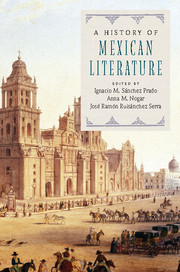Book contents
- Frontmatter
- Contents
- List of contributors
- Introduction
- PART I COLONIAL LITERATURE
- PART II THE NINETEENTH CENTURY
- PART III TWENTIETH AND TWENTY-FIRST CENTURIES
- 15 The Ateneo de la Juventud: The Foundations of Mexican Intellectual Culture
- 16 Regimes of the Avant-garde: Colonialists, Stridentists, Proletarians, Surrealists, Contemporáneos, and Independent Rupture (1920–1950)
- 17 The Institution of Fiction: From Yáñez, Rulfo, and Fuentes to Pitol and Del Paso
- 18 Octavio Paz: Literature, Modernity, Institutions
- 19 Mexican Poetry after the Avant-garde
- 20 Nonfictions: Essay, Criticism, and Chronicle
- 21 Balancing Acts: Twentieth- and Twenty-First-Century Mexican Theater
- 22 Women Writers in the Land of “Virile” Literature
- 23 The Hidden Histories of Gender: LGBTQ Writers and Subjectivities in Mexico
- 24 Mexican Literature in the Neoliberal Era
- PART IV MEXICAN LITERATURE BEYOND BOUNDARIES
- Index
- References
15 - The Ateneo de la Juventud: The Foundations of Mexican Intellectual Culture
from PART III - TWENTIETH AND TWENTY-FIRST CENTURIES
Published online by Cambridge University Press: 05 July 2016
- Frontmatter
- Contents
- List of contributors
- Introduction
- PART I COLONIAL LITERATURE
- PART II THE NINETEENTH CENTURY
- PART III TWENTIETH AND TWENTY-FIRST CENTURIES
- 15 The Ateneo de la Juventud: The Foundations of Mexican Intellectual Culture
- 16 Regimes of the Avant-garde: Colonialists, Stridentists, Proletarians, Surrealists, Contemporáneos, and Independent Rupture (1920–1950)
- 17 The Institution of Fiction: From Yáñez, Rulfo, and Fuentes to Pitol and Del Paso
- 18 Octavio Paz: Literature, Modernity, Institutions
- 19 Mexican Poetry after the Avant-garde
- 20 Nonfictions: Essay, Criticism, and Chronicle
- 21 Balancing Acts: Twentieth- and Twenty-First-Century Mexican Theater
- 22 Women Writers in the Land of “Virile” Literature
- 23 The Hidden Histories of Gender: LGBTQ Writers and Subjectivities in Mexico
- 24 Mexican Literature in the Neoliberal Era
- PART IV MEXICAN LITERATURE BEYOND BOUNDARIES
- Index
- References
Summary
The group of the Ateneo de la Juventud (Youth Athenaeum), later known as the Ateneo de México (Athenaeum of Mexico, 1912), was founded in 1909. It was a unique group in the Mexican intellectual landscape at the beginning of the twentieth century, because many of its members would later become famous and because it hosted significant events in Mexican cultural history. We will examine the intellectual history of this particular group and the changes in its composition and organization. We will also interpret its ideological foundations as they relate to the political and social changes that were happening in Mexico at the time. This will allow us to understand the cultural and political roots of the concept today known as mexicanidad (Mexicanness).
The Ateneo group is generally understood as a reaction to literary and cultural modernism, which advocated an aestheticizing and bohemian role for intellectuals in society. The Ateneo promoted development based on the humanities, it encouraged significant university reform, and its intellectual leaders influenced Latin America and Spain. It was a heterogeneous group, composed of writers, doctors, architects, and painters, such as José Vasconcelos, Alfonso Reyes, Antonio Caso, Martín Luis Guzmán, and Diego Rivera. They inherited the modernist cultural background from two journals: Revista Moderna (1898–1903) and Savia Moderna (1906). Their interests were more literary than either journal. The Ateneo's most significant period was between 1906 and 1914, when the Dominican teacher Pedro Henríquez Ureña influenced the group. Henríquez Ureña, who had been based in Mexico since 1906, was one of the most prominent essayists and critics of his time, and counseled the younger group of Mexican intellectuals.
Henríquez Ureña strongly critiqued positivism from a Latin American perspective. Although his movement originated in the Americas, his extensive knowledge of European culture marked the Ateneo members, who admired Greek and neoclassical European philosophers. Henríquez Ureña's main works, Horas de estudio (1910) and Seis ensayos en busca de nuestra expresión (1924), relate intellectual and political history with cultural and literary criticism.
Henríquez Ureña was not the only intellectual giant to influence the Ateneo. The Ateneo's entire intellectual thrust, in fact, represented a shift from the Porfirian period to the Mexican Revolution, and its projects reflect this massive change.
- Type
- Chapter
- Information
- A History of Mexican Literature , pp. 233 - 245Publisher: Cambridge University PressPrint publication year: 2016



